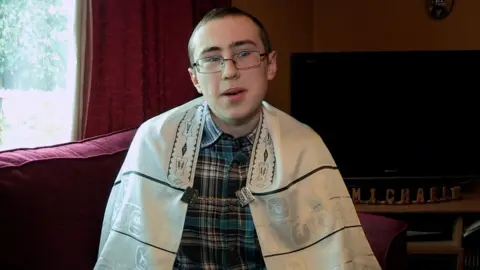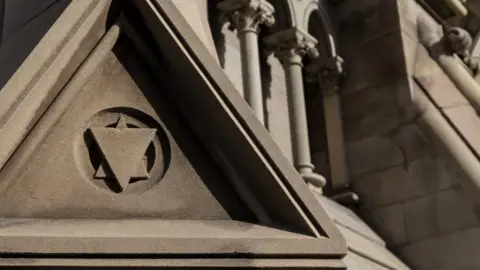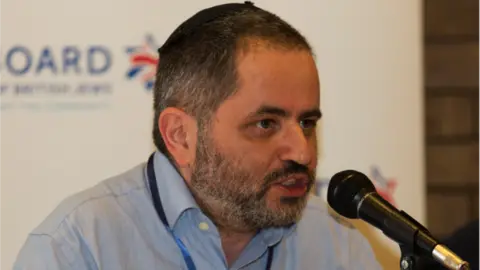Growing up in Northern Ireland's tiny Jewish community
The Jewish community has had a presence in Northern Ireland since the mid-18th Century.
At its peak, there were about 1,500 members but the population has been in sharp decline.
The last remaining Northern Ireland synagogue, in north Belfast, has seen its numbers drop to just 76 - most of whom are elderly.
Michael Walker, 16, is one of a handful of young Jewish people left in this tiny community.
"There aren't that many roughly my age - there are only about four or five of us," he said.
"We don't really see each other that often."

Michael has lived in Northern Ireland all his life and his ancestors are from Jewish communities in Great Britain.
His grandmother is originally from London and his grandfather from Glasgow.
Having had his Bar Mitzvah three years ago, he is beginning to feel the demands of early adulthood.
For Michael now counts as part of the minyan - a quorum of 10 Jewish men needed for traditional public Jewish worship.

What is Judaism?
Judaism is the religion or culture of Jewish people and the profession, practice, or doctrines of the Jewish religion.
Alongside Islam and Christianity, it is one of the three Abrahamic religions.
Judaism originated in the Middle East more than 3,500 years ago.
According to non-profit organisation the Jewish Agency for Israel, as of 2018 there are 14.7m Jewish people worldwide.
The Bar Mitzvah is a coming-of-age ritual which Jewish boys go through when they reach the age of 13 (Jewish girls go through it at 12), at which point they are seen as becoming responsible for their own actions.
According to Jewish law, he or she is also now eligible to own property and to get married.

'Bit of pressure'
He is often needed to complete the minyan as the community struggles to meet the quota.
"There's a bit of pressure to kind of turn up," he said.
"It's important that we get the minyan - sometimes they only get nine and they're kind of annoyed that they're missing one person.
"When the 10th person sometimes is me, they say, 'Hey, Michael's here, we can start'."
 Getty Images
Getty ImagesMichael admits he does not wear a traditional skullcap most of the time, to avoid getting "funny looks" from those not accustomed to Jewish customs.
"Being in Northern Ireland, everyone thinks about the Protestants and Catholics but no-one thinks about us," he said.
"As there's not that many people left in the Jewish community in Northern Ireland, it will probably stay like that unless people are educated more about other religions."
'Jewish exodus'
Belfast-born Steven Jaffe, 54, a consultant to the Jewish Leadership Council, said youthful celebrations like Bar Mitzvahs and weddings were now rare.
In fact, he believes Michael's Bar Mitzvah may have been the last one held in Northern Ireland.
Mr Jaffe said he, too, was part of the Jewish exodus from Northern Ireland and chose to raise his family in London partly because of the availability of Jewish schools and kosher restaurants.
Recalling his own childhood, he said there was a sizeable young Jewish community in Belfast in the 1970s and 1980s.
"I was lucky when I was growing up, as there was about 30 of us although by the time I was 18 that had fallen to around 10," he said.

"Having the absence of a cohort of Jewish friends his age must be very difficult for Michael.
"The ageing community is a result of young people graduating to the larger communities in London and Manchester, or assimilating.
"Many have drifted away from the Jewish community and some have gone to live in Israel."
Mr Jaffe said the community, distinctive because of its relative geographic isolation, had so far defied predictions that it would disappear.
"Twenty years ago, people were saying it did not have a future, yet in 2019 they have a minister, they have services every Sabbath," he added.
"It is amazing it is continuing."
